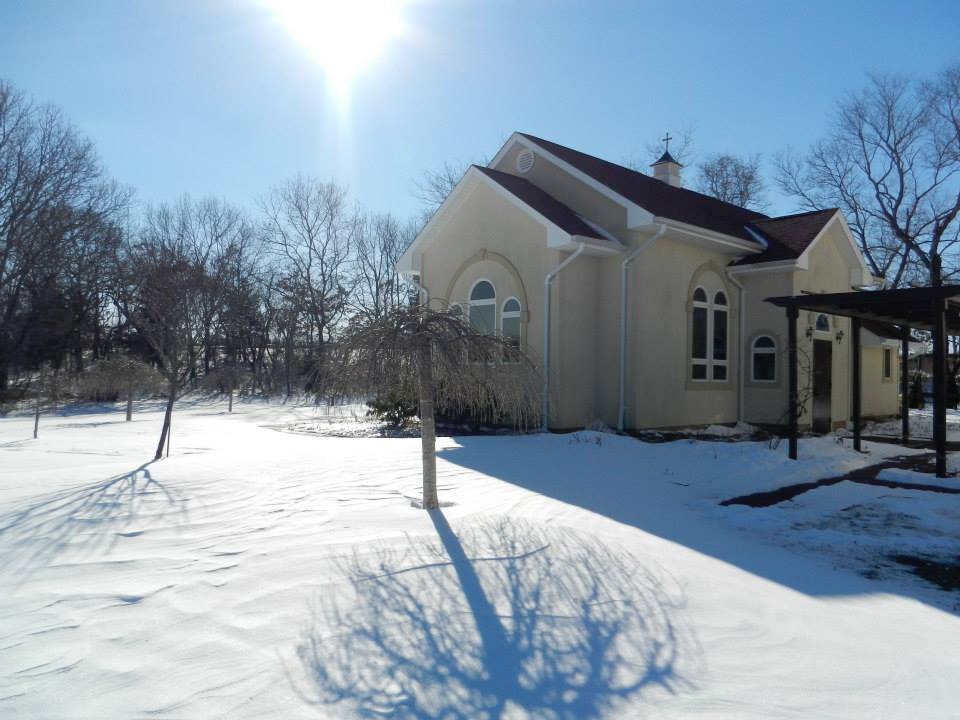"There is neither Jew nor Greek, there is neither slave nor free, there is neither male nor female; for you are all one in Christ Jesus." (Galatians 3:28)
Introduction by Sarah Parro
Many Orthodox parishes have service and outreach programs to answer Christ’s charge in Matthew 25 to care for the hungry, the poor, the sick and the imprisoned. Perhaps your parish sponsors a meal for the homeless community in your area or collects winter clothing donations for children whose families cannot afford warm coats. All Saints Monastery, a women’s monastery in Calverton, New York, is in the midst of developing a support and rehabilitation program for women who are survivors of human trafficking. It’s called HOPE Project—HOPE here stands for housing, occupation, potential and education—and there is much we can learn about the meaning of Christian diakonia (service) from programs like this. PRAXIS spoke with HOPE Project Executive Director Anastasia Karloutsos-Lazarakis about the inspiration for and development of this important program and what it means to consider all people “one in Christ Jesus,” as St. Paul says in Galatians.
“When you’re reading something like, ‘neither slave nor free,’ and we are ‘all one in Christ,’ this is so important,” Anastasia said. Human trafficking victims may be arrested for prostitution-related crimes; once that happens, “that is forever on your record.” And that record, she pointed out, follows someone into job interviews and throughout his or her life. “How, then, can you really free yourself after something like that?” Anastasia asked, revealing a driving question behind the mission of HOPE Project.
Anastasia, who holds a master’s degree in social work, has always been passionate about women’s issues. Coming from, as she says, a “very clergy” family—off the top of her head, she included her grandfather, father, uncles, cousins and husband on the list of ordained family members—and living twenty minutes away from the monastery on Long Island, she was well-suited to help bring a program like HOPE Project into reality. She connected with the nuns at All Saints and shared the frightening realities of this horrendous issue: the International Labour Organization estimates that 20.9 million people in the world are victims of human trafficking. The Polaris Project, a nonprofit anti-trafficking organization, looked at information gathered from survivor accounts; out of 123 survivors who revealed the age at which they first engaged in commercial sex, almost half (44 percent) estimated that they were seventeen years old or younger. While this is a more limited example, the data is equally disturbing. Inspired by such grim findings, Anastasia and the nuns cofounded HOPE Project as a mission of the monastery committed to providing support, hospitality, education and healthcare to women who have survived human trafficking.
Below, you’ll learn more about HOPE Project through Anastasia’s own words. May it inspire you to respond to Christ’s charge with patience, enthusiasm and prayer—to reach out and serve those who are suffering with the motivation and underpinnings of our Orthodox faith. Perhaps Anastasia put it best: “If you can dream it outside the Church, then you can dream it within the Church.”
The International Labour Organization estimates that 20.9 million people in the world are victims of human trafficking.

Chapel of Sts. Constantine and Helen, All Saints Monastery
Hope Project: History and Meaning
Our vision is to create a program that is rehabilitative, healing and transformational to survivors of human trafficking in our local community. Our mission is inspired by the lives of three Orthodox Saints who were revolutionary in the work with victims of human trafficking: St. Philothei of Athens, St. Nicholas of Myra and St. Theodora, wife of Emperor Justinian I, all worked to put an end to the horrendous practice of selling and enslaving people. Although the program is a ministry of All Saints Monastery and the Greek Orthodox Church, there will not be a mandatory religious component. Participants of all faiths and backgrounds are welcome and respected.
One of the greatest challenges survivors face on their path to healing and restoration is finding housing; therefore, the principle foundation of our program is to provide free housing for these women as they heal and are rehabilitated. Women will be given the opportunity to stay rent free for two years as they find recovery and healing as well as acquire the skills necessary to provide for themselves and live independently. Our prayer is to open this home within the next year.
In October 2016 we began a prison outreach as part of our mission. Many individuals who are arrested for prostitution are actually victims of human trafficking. Once in prison, there are therapeutic counseling groups that they can attend. Along with another agency in our area, we have the opportunity to facilitate these groups and form connections with women who will benefit from our program. We will also be distributing bags called HOPE Totes as part of our prison outreach: when a woman or teen is released from prison, she will receive a duffle bag filled with new clothing, gift cards and personal care items in order to help her integrate back into society and reduce the likelihood that she will reconnect with her trafficker.
In addition, all participants will be provided with both individual and group therapy, enabling them to find the emotional healing and support they desperately need. Psychotherapy will be provided and, whenever necessary, participants will be able to attend weekly or daily twelve-step program meetings (many sex trafficking victims struggle with drug addiction), giving them the strength to stay sober, find support and, in turn, offer support to others.
HOPE Project will provide the education and skills these women need in order to live productive and successful lives once they have found emotional healing. This includes GED tutoring or enrollment in our local community college (or both) for qualified participants. Additionally, life skills such as cooking, managing personal finances, computer literacy, health and hygiene, etc., will be part of the educational component offered.
We will also offer crucial job training to participants through the monastery’s certified B Corporation company, White Field Farm. This small company specializes in handmade soy candles, natural soaps and lotions. Work is a blessing and a privilege, and as women find emotional healing and strength they will have the reward of a paid position that provides job training and experience. Through their work, they will learn responsibility, perseverance and how to work well with others, as well as valuable skills to add to their résumés. This training will ultimately provide women with an income leading to an independent lifestyle. With their earnings, participants will experience newfound freedom to make decisions about their personal finances. As the program grows, we hope to provide a savings-matching program to participants who choose to set aside a portion of their earnings for things like a car or apartment. Finally, HOPE Project will provide résumé-writing workshops, career counseling, interview coaching and education on workplace etiquette as participants prepare to graduate and take the next step in their life.
It is our hope that living, working and participating in a nonjudgmental, loving, caring and giving environment will enable survivors to find the healing and support they need to live healthy, productive and joyful lives.
To learn about White Field Farm and purchase natural, homemade products from their shop by visiting www.whitefieldfarm.org.
Diakonia in the Lives of Our Saints
St. Philothei of Athens (Feast day: February 19): At a young age, St. Philothei was forced into a cruel and abusive marriage. After the death of her husband and parents, St. Philothei established a women’s monastery. She bought the freedom of many Greeks enslaved by the Ottoman Turks and provided refuge to women who had been forced into harems.
St. Nicholas of Myra (Feast day: December 6): St. Nicholas the Wonderworker, Archbishop of Myra, lived during the reign of St. Constantine the Great. Among his many miracles and stories of his mercy is the account of the poor man who could not afford a dowry for his three daughters. If left unmarried and without financial stability, the daughters were likely to become prostitutes. St. Nicholas secretly paid their dowry to save them from this fate.
St. Theodora (Feast day: November 14): St. Theodora, wife of Emperor Justinian I, was perhaps one of the most powerful women in Byzantine history. She is known for using her authority to champion for women’s rights. St. Theodora herself worked as a prostitute in her early life, and during her reign as empress she shut down brothels and passed laws prohibiting forced prostitution and the trafficking of young girls.
Presvytera Anastasis Karloutsos-Lazarakis is cofounder and executive director of HOPE Project. She holds an MSW from Fordham University. She and her husband, Rev. Fr. Constantine Lazarakis, are blessed to serve the parish of Dormition of the Virgin Mary in Southampton, New York. They have three awesome children who are experts at keeping them on their toes.
Like what you’re reading? Visit the Religious Education Department to view back issues of PRAXIS and learn how to subscribe. You may also contact the Department of Religious Education by phone at (646) 519–6300 or by email at [email protected].
